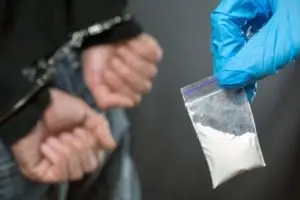
Texas considers the unauthorized manufacture, possession, or distribution of controlled or illicit substances to be a drug offense. Some forms of illegal substances include marijuana, narcotics, methamphetamine, opiates, hallucinogens, and cocaine.
The Texas Controlled Substances Act applies to both prescription and “street” drugs. For example, it is illegal in Texas to possess someone else’s prescription drugs, if the statute controls the particular drug or its category. An individual can only have a “controlled substance” prescription drug if a health care practitioner ordered or prescribed the medication.
If you are facing the possibility of a drug conviction, a Houston, TX criminal defense lawyer may be able to assist you. They can explain what is considered a drug offense and address the charges against you.
Penalties for Drug Offense Convictions in Texas
Texas has a reputation throughout the United States for being tough on drugs.
Three factors determine how severe the penalties will be for a drug conviction:
- What kind of drug the defendant made, possessed, or distributed
- The quantity of the drug
- Whether children were present when the alleged drug offense took place
Getting caught with less than one gram of a controlled substance (including added things like adulterants and dilutants) can land a person in jail with a felony drug conviction. Depending on the type of drug and the amount, a person could face imprisonment for 10 years, 15 years, 99 years, or life. The fines can be as high as $100,000 or $250,000.
If the drug offense occurred when a child under the age of 18 was present, the court may apply enhanced penalties, according to Texas Health and Safety Code §481.1122.
Specialty courts, like the Success through Addiction Recovery (STAR) Drug Court, try to treat and rehabilitate people who struggle with substance abuse. The goal is to help people rebuild their lives, conquer their addiction, and prevent repeat offenses.
For a legal consultation, call 713-225-1900
An Overview of Drug Offense Categories in Texas
The Texas Controlled Substances Act separates drug offenses into these categories:
Penalty Group 1 Drug Offenses
This group centers on opiates and related drugs, including opium, heroin, cocaine, codeine, oxycodone, methadone, and morphine. Having less than one gram of a Penalty Group 1 drug illegally is a state jail felony.
Having more than 400 grams is a 1st-degree felony, which carries penalties of up to 99 years (or life) in prison and/or a fine of up to $100,000. Between 200 and 400 grams is a 1st-degree felony with a fine of up to $10,000, but prison time is between 5 and 99 years. Four to 200 grams is a 2nd-degree felony, and one to four grams is a 3rd-degree felony.
Penalty Group 1-A Drug Offenses
These drugs include LSD and similar substances. The level of penalties depends on the number of units the defendant possessed. The lowest penalty for this group is a state jail felony.
The highest penalty for a Penalty Group 1-A offense is a 1st-degree felony with a fine as much as $250,000 and imprisonment for 15 to 99 years, or life. This subcategory is for having more than 8,000 units of a Penalty Group 1-A drug.
Penalty Group 2 Drug Offenses
This category contains substances like hash oil, methamphetamine (meth), tetrahydrocannabinol (THC), and mescaline. The prison terms for Penalty Group 2 drugs include up to 99 years or life in prison with a maximum fine of $50,000.
Penalty Group 2-A Drug Offenses
This category contains synthetic marijuana and analogs. The prison terms for Penalty Group 2-A drugs range from 6 months in state jail up to 99 years or life in prison with a maximum fine of $50,000.
Penalty Group 3 Drug Offenses
This group includes stimulants, depressants, peyote, and some other substances. The possible prison time and fines are similar to those for a Penalty Group 2 drug offense.
Penalty Group 4 Drug Offenses
These drugs are primarily prescription drugs that contain some narcotic medications, like codeine. The penalties range from misdemeanor offenses to 1st-degree felonies.
Enhanced Penalties
Someone convicted of making or delivering a controlled substance illegally can get enhanced penalties if the drug kills or causes severe harm to someone. The judge or jury must find, beyond a reasonable doubt, that the death or substantial harm resulted from using the drug, no matter how small the amount ingested, according to the Texas Health and Safety Code §481.141. Call us and hire a drug offense lawyer in Houston, TX in minutes.
What Can Be a Drug Offense in Texas
People are often surprised to learn what is considered a drug offense in our state.
Here are some examples of things that can be drug offenses in Texas:
- Making or processing controlled substances
- Delivering controlled substances
- Selling, buying, or bartering for controlled substances
- Making, delivering, or possessing drug paraphernalia
- Making, delivering, possessing, or buying suspicious amounts of specific chemical components, ingredients, or precursors to controlled substances
- Selling, transferring, receiving, or providing a laboratory apparatus for use in the manufacture or processing of a controlled substance
- Falsifying drug test results
There are other examples of drug offenses that we have not included here.
Click to contact our Houston lawyer today
How to Get Help
Time in prison, massive fines, and a permanent mark on your criminal record can change the course of your life. We understand the devastating impact that a drug offense conviction can have on your future. At Blass Law, we work hard to get you the best possible outcome for your criminal charges.
You can call us today at (713) 225-1900 to learn more.
Call or text 713-225-1900 or complete a Case Evaluation form



